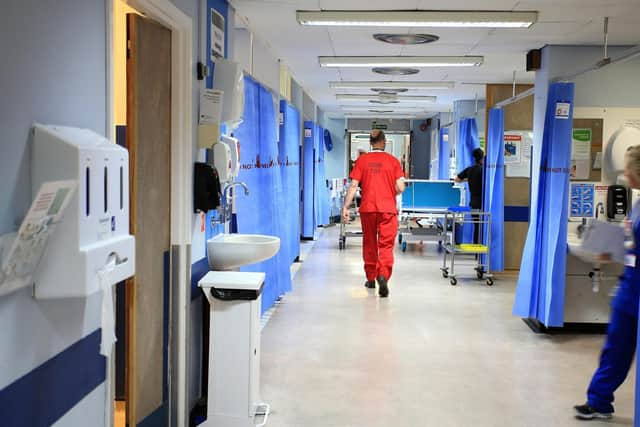NHS Scotland: Medics warn Scottish nursing in 'desperate situation' as student numbers fall again
Scottish nursing is now in a “desperate situation”, health leaders have claimed, as university figures revealed the number of applicants for nursing courses has fallen for the third successive year.
Figures published by the Universities and Colleges Admissions Service (UCAS) show the number of applicants for nursing courses in Scotland is down 8.3 per cent compared to the same point last year. The Royal College of Nursing (RCN) has described the decline as “an extremely worrying trend”.
Advertisement
Hide AdAdvertisement
Hide AdBy the January deadline, 4,650 people had applied to study nursing in Scotland starting from autumn this year, compared to 5,070 at the same point last year.


This is now the third year in a row where there has been a drop and, in Scotland, the number of applicants remains below pre-pandemic levels.
According to UCAS, applications to nursing have dropped across all specialisms, but particularly adult nursing and mental health nursing. This fall in demand is being driven mainly by reductions in UK mature applicants, which have fallen by 10 per cent in the past year.
The figures represent around 70 per cent of total applicants to nursing for this cycle, with the remaining students beginning their studies at different times of the year.
Eileen McKenna, an associate director at RCN Scotland, said nursing “remains a fantastic career”, but the figures suggested getting that message to potential applicants was “getting harder and harder every year”.
“That’s now three years in a row that the number of applicants at this time of year has fallen and it’s an extremely worrying trend,” she said.
“Scotland does not have the number of nurses now that it needs to meet the demand for care in health and social care services. The NHS alone has more than 3,700 registered nurse vacancies.
“This is a desperate situation and it is more important than ever that the Ministerial Nursing and Midwifery Taskforce proposes the right actions to directly address the workforce challenges.
Advertisement
Hide AdAdvertisement
Hide Ad“The Scottish Government must back the taskforce up by finding the financial resources needed to deliver change and ensure nursing is positioned as a career of choice.”
The attractiveness of nursing as career has diminished in recent years due to the financial worries of students and sustained pressure on nurses once in post
An RCN survey of nursing students carried out in August last year found two-thirds of Scotland’s student nurses were considering quitting due to financial pressures.
An online survey of 1,046 Scottish nursing students found nearly all (99 per cent) of would-be nurses were concerned about their finances.
According to the RCN’s report, the vast majority of respondents reported financial concerns were affecting their health. Three-quarters said these concerns had had a high or very high impact on their mental health (74 per cent), and nearly half reported a high or very high impact on their physical health (48 per cent).
Once in post, nurses are experiencing immense pressure and difficult working conditions. Last year, a nurse from the NHS Lothian area told The Scotsman how working 13-hour shifts in both care home and hospital settings had become the norm.
Over her years working in the NHS, the nurse, who wished to remain anonymous, said “staffing has reduced while demand has stayed the same”.. “Morale is lower, certainly than it was ten years ago”, she said.
Dr Jo Saxton, the chief executive of UCAS, said that although the data showed a decline in applications from mature students, which would be more keenly felt in subjects such as nursing, “we know that these applicants are more likely to apply later in the cycle”. However, this does not explain why the number of nursing applications has fallen year on year.
Advertisement
Hide AdAdvertisement
Hide AdScottish Liberal Democrat leader Alex Cole-Hamilton said the “worrying downward trend” was part of a “vicious cycle”.
“If courses don’t fill up, existing staff come under greater pressure and more patients suffer,” he said. “The SNP are putting the very future of our health service at risk.
“The complete failure by this SNP-Green government to recruit and retain staff stretches all the way back to Nicola Sturgeon cutting training places and claiming that was ‘sensible.’
“[New health secretary] Neil Gray has his work cut out. He must completely overhaul the failed NHS recovery plan of his predecessors and do everything possible to promote nursing as a rewarding career.”
The concerns were voiced as Mr Gray declared tackling long waits for treatment in the NHS would be one of his “overriding priorities”.
“I recognise for too many people the waits are too long, and that is going be one of my overriding priorities, to try to see that continuous improvement and to make sure the capacity is there that we are able to respond to the needs of the people of Scotland,” he said.
A Scottish Government spokesperson said: “Nurses in Scotland are the highest paid in the UK. We also provide the highest non-repayable, non-means tested bursaries at £10,000 for eligible nursing and midwifery students, as well as reimbursement of expenses and a range of allowances to support entry to the profession.
“However we know that overall, applications have declined for nursing and that’s why we are working closely with the Royal College of Nursing and our other key partners as part of the Nursing and Midwifery Taskforce to develop alternative career pathways into these critical professions. This approach recognises a growing interest in flexible learning models which allow students to earn and study at the same time.”
Comments
Want to join the conversation? Please or to comment on this article.